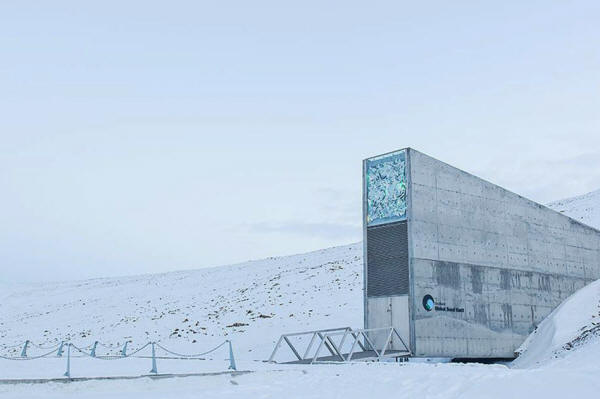|

by Lorraine Chow
February 26,
2018
from
EcoWatch Website
Italian
version

Nestled in the Svalbard archipelago
lies a
small unassuming-yet-sturdy building
housing
the world's largest collection
of crop
diversity.
Crop
Trust
The
Svalbard Global Seed Vault in the
Arctic Circle -
also known as the "doomsday
vault" safeguarding the world's most diverse collection of seeds
- now holds 1,059,646 unique crop varieties after receiving more
than 70,000 samples on Monday.
Depositors from 23
seed banks around the world braved sub-zero temperatures to deliver
duplicate seeds of vital staples such as rice, wheat and maize;
black-eyed pea, a major protein source in Africa and South Asia; and
samples of sorghum, pearl millet and pigeon pea.
Several
lesser-known crops such as the Estonian onion potato and the Bambara
groundnut, a drought-tolerant crop being developed in Africa, also
made the journey.
"Hitting the
million mark is really significant," Hannes Dempenwolf, senior
scientist of the Crop Trust,
an international organization that funds and manages a global
system of seed collections, told
BBC.
"Only a few
years back I don't think we would have thought that we would get
there."
Monday also marked
the tenth anniversary of the Global Seed Vault.
The vault, located
on the side of a mountain on a remote Norwegian island, is designed
to safeguard the planet's precious seed varieties against loss of
crop diversity caused by
climate change, natural disasters or war.
Deliveries are made
several times a year from countries that include,
-
the U.S.
-
Australia
-
Burundi
-
Colombia
-
Germany
-
India
-
Japan
-
North Korea
-
Russia,
...and many others.
"The Svalbard
Global Seed Vault is an iconic reminder of the remarkable
conservation effort that is taking place every day, around the
world and around the clock - an effort to conserve the seeds of
our food crops," said Marie Haga, executive director of the Crop
Trust, in a statement.
"Safeguarding
such a huge range of seeds means scientists will have the best
chance of developing nutritious and climate- resilient crops
that can ensure future generations don't just survive, but
thrive."
The vault can store
up to 4.5 million varieties of crops.
Each variety contains an
average of 500 seeds, which amounts to a maximum capacity of 2.5
billion seeds.
Last year,
the
vault suffered
flooding after warmer-than-average temperatures caused a layer
of permafrost to thaw. No seeds were damaged, but the Norwegian
government is working to protect the vault against increasingly
extreme weather.
Norway announced
Friday it plans to spend
$13 million on upgrades that will cover,
"construction
of a new, concrete-built access tunnel, as well as a service
building to house emergency power and refrigerating units and
other electrical equipment that emits heat through the tunnel,"
the Agriculture Ministry said in a statement.
"The tenth
anniversary is a major milestone for the Svalbard Global Seed
Vault," said Jon Georg Dale, the Minister of Agriculture for the
Norwegian government, which jointly runs the facility with the
Crop Trust and the Nordic Genetic Resource Center.
"It comes at a
time when agriculture is facing multiple challenges from extreme
weather and the demands of a world population expected to reach
10 billion people by 2050.
This means it
is more important than ever to ensure that seeds - the
foundation of our food supply and the future of our agriculture
- are safely conserved."
|


